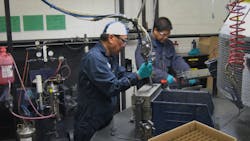2014 IW Best Plants Winner: How L.B. Foster’s Vancouver Plant Created a Culture of Lean
You don’t actually see lean in action at the L.B. Foster Rail Technologies Corp. plant in Vancouver, B.C., as much as sense it. But dig into the metrics, investigate the day-to-day practices and talk to the team, and the continuous improvement focus becomes clear. The effort permeates the place, without being obvious.
The focus is apparent in the lab, in the administrative and executive offices, and, of course on the plant floor. But more interesting is how continuous sustainable improvement efforts bridge the boundaries between and among the groups.
At A GlanceeL.B. Foster Rail Technologies Corp. Vancouver, B.C. Employees: 51 Total Square Footage: 45,000 Primary Product/Market: friction management products (solid stick consumables and hardware) Start-up Date: 1994 Achievements: Increased Kgs of finished product per man hour by 83.75% in three years; 54.5% improvement in first pass yield in three years; 1,678 lost-time-free workday
|
The facility is a little different from most other manufacturing facilities in that it houses substantially sized research and development labs, along with the factory floor, warehouse space and offices.
In the labs, research scientists, led by Consumables Group Lead Louisa Stanlake, Ph.D., devise new formulas for spray-on and solid-stick friction-control materials. On the plant floor, production workers, led by Manufacturing Coordinator Nigel Davis, produce the solid-stick lubricants and the hardware (brackets and applicators) to apply them. Throughout, the supply chain group, headed by Jonathan de Wet, leads the effort to identify, vet and manage the accurate flow of materials from the myriad specialized vendors. Dieter Thies is the Quality Assurance Manager and the Environment, Health & Safety Representative.
Combined, the focus of plant operations is the R&D and delivery of proprietary Total Friction Management Systems (TFM) for freight rail and transit authorities.
But it’s a little more complicated than that. Because no single type of application system is appropriate for every customer, plant operations focuses on tailoring custom systems for each customer’s needs. As a result, the plant produces more than 137 bracket designs and 200 types of applicators.
It’s this successful integration of workgroups, built upon the "continuous improvement is the way we do things" attitude throughout the facility, and the plant’s stellar metrics that earn the L.B. Foster team the IW Best Plants award this year.
Creating the Lean Culture
Steve Fletcher, general manager of the plant, credits a combination of entrepreneurial spirit and corporate influence for leading the facility to adopt such a seamless approach to lean practices.
The facility’s entrepreneurial roots, he recounts, date back to the company started by the inventor of friction management technology. Since its origins, Fletcher notes, people working together to improve was part of the process of developing a market for new products -- and many of the people now work at the plant. They’re the people, he added, who "like working with the customer, understanding what’s important to them and translating that value back to something we’re trying to do."
After the acquisition by L.B. Foster, corporate leaders John Kasel and Steve Burgess "set up a process to try to encourage us to see that things could be better," Foster recalls. "Steve came in and ran through a bunch of different types of processes to try to identify inefficiencies, and [introduced] lean, etc… and he just really encouraged the people to develop those [the processes] themselves."
Foster adds that he believes that approach -- of teaching and leading people to practice lean -- helped embed lean practices into the plant’s culture. "They didn’t beat you over the head and say, 'do this, do this, do this.’"
About the Author
Patricia Panchak
Patricia Panchak, Former Editor-in-Chief
Focus: Competitiveness & Public Policy
Call: 216-931-9252
Follow on Twitter: @PPanchakIW
In her commentary and reporting for IndustryWeek, Editor-in-Chief Patricia Panchak covers world-class manufacturing industry strategies, best practices and public policy issues that affect manufacturers’ competitiveness. She delivers news and analysis—and reports the trends--in tax, trade and labor policy; federal, state and local government agencies and programs; and judicial, executive and legislative actions. As well, she shares case studies about how manufacturing executives can capitalize on the latest best practices to cut costs, boost productivity and increase profits.
As editor, she directs the strategic development of all IW editorial products, including the magazine, IndustryWeek.com, research and information products, and executive conferences.
An award-winning editor, Panchak received the 2004 Jesse H. Neal Business Journalism Award for Signed Commentary and helped her staff earn the 2004 Neal Award for Subject-Related Series. She also has earned the American Business Media’s Midwest Award for Editorial Courage and Integrity.
Patricia holds bachelor’s degrees in Journalism and English from Bowling Green State University and a master’s degree in Journalism from Ohio University’s E.W. Scripps School of Journalism. She lives in Cleveland Hts., Ohio, with her family.
